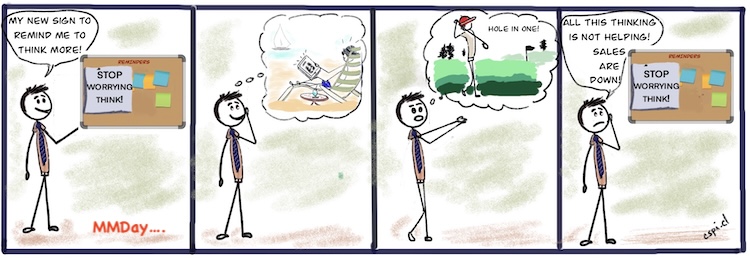A common success factor uniting managers and leaders from supervisor to CEO, is the practice of attentive thinking.
For each level in the organization what the most important things they think about from a work perspective varies:
Supervisor: Thinking about getting work done and achieving results 1 day to 3 months out.
Ist line Manager: Thinking about achieving results 1 year out, quarter by quarter
Middle Managers and Function Heads: Thinking about objectives 1 to 3 years out
Senior Execs, GMs: Thinking about strategic objectives and their implementation 1 – 5 years out
CEO GM: Thinking about strategy and alignment with Vision 5 -10 yrs out
Group CEO VP: Vision and Strategy: 10 – 30 years out
International President: Vision and investment: far out!

Attentive Thinking Versus Worrying
Attentive thinking is different from worrying. To worry is to experience emotionally the fear of something happening in the future. It is the opposite of attentive thinking and stems from thoughts that the brain plants to trigger actions to protect you from the consequences of your worries. Simply put worries are emotional experiences involving unpleasant and persistent thoughts about the future.
Attentive thinking, on the other hand, is being curious about some challenge or concern. What triggers and drives attentive thinking is a question. Every manager/leader should be attentively thinking about a few important questions. Let me give you some examples:
“What must be done to increase engagement of my staff?”
“What if I were to double productivity – what would have to happen?”
“How do I transform the safety culture in the company so that everyone feels and acts to ensure safety?”
“How do we respond to a disruption that is coming?”
“How do I improve my performance feedback discussions, especially when the feedback is negative?”
Effective manager/leaders do not ponder these questions alone. They employ a number of methods:
- Dialog – speaking to one or more people about what you are curious about. Dialog is a curious mind being open to other viewpoints, information , ideas or opinions. It is different to a discussion in which people are attempting to persuade each other as to their ‘being right’ in their views.
- Researching. With the advent of some AI apps and sites this has become easier. The attitude of an attentive thinker is not to seek an answer by using AI but by seeking viewpoints and ideas.In this way using ChatGPT or Perplexity closely models dialog. I have found Perplexity to be the best for this for three reasons: The answers that it provides are on point to the question that you have asked. Second, It gives you links to the sources that it used to provide the answers and third, it prompts you with several follow on questions you can ask if you want to dig deeper.
- Books are another source of research materials but seldom are as focused as the question you are pondering.
- Going to an expert is extremely useful. In medium to large companies there are frequently experts in any aspect of the business. Ask the CFO to enlighten you on capital acquisitions and decisions regarding allocation, ask a manager with a reputation for fully engaged staff how she achieves that, ask an engineer about some aspect that is intriguing you. Do not worry about seniority. It might be a frontline worker who can help your understanding of some aspect of the business, or the CFO or Head of Procurement.
- Training can be useful if you select training that is clearly about the question you are pondering.
What you will find is that your original question will lead to further questions as you dig deeper into the matter that you are curious about.
Know your questions
Attentive thinking means that you are paying attention to a question and all that you can learn about forming answers.
Questions are very powerful:
At some point the UBER founders must have asked the question “What if every driver is a taxi driver?”, or KFC founder, Colonel Saunders wondered “What if I can develop a chicken rub that is so great that I get paid royalties for its use?” or Dr. Chris Barnard the South African doctor “What if we could swap out a heart for a new one?”
‘What if’ questions can lead to actions that can lead to big changes.
“How do I/we……” questions lead to good practices. “How do I delegate better?” “How do I make better presentations?” “How do we drastically reduce the time to hire new staff?
“What is the reason why…..?” questions lead to finding root causes of unacceptable process and other outcomes. “Why are suppliers not being paid on time always?” “Why does it take 15 days to deliver orders?”
“What are our customers experiencing?” leads to finding things that go wrong when accessing our services leading to opportunities to improve customer satisfaction.
At some point, as you seek answers to your question(s), you will get into action. These questions that managers ponder are not academic inquiries, they are focused on finding answers and implementing solutions to possibilities that managers are curious about because they want to make a difference.
As a manager/leader know at any point in time what questions you are pondering. If you do not know then you are just worrying which is bad for stress!!

